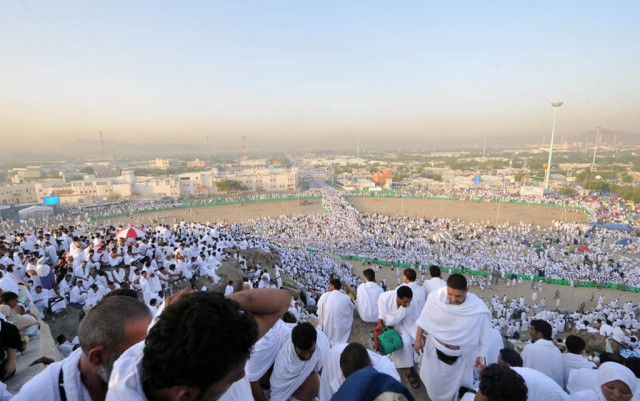Pilgrims throng Mount Arafat for hajj highpoint
Officials said they expected around 1.5 million pilgrims to descend on the site.

Pilgrims in their hundreds of thousands thronged Mount Arafat in Saudi Arabia from early morning for the climax of the annual hajj pilgrimage, arriving on foot, by train or in vehicles. PHOTO: AFP
Officials said they expected around 1.5 million pilgrims to descend on the site, where they were to offer prayers and later in the day to listen to the annual sermon from Saudi top cleric Sheikh Abdulaziz al-Sheikh.
Helicopters hovered overhead and thousands of troops stood guard to organise roads flooded by men, women and children streaming towards Mount Arafat.
Chanting "Labaik Allahum Labaik" (I am responding to your call, God), many of them camped in small colourful tents and took shelter under trees to escape temperatures of around 40 degrees Celsius. Special sprinklers were also helping cool the pilgrims.
Numbers are sharply down from last year, due to fears linked to the MERS virus and to multi-billion-dollar expansion work at the Grand Mosque to almost double its capacity to around 2.2 million worshippers.
Governor of Makkah province and head of the central hajj committee Prince Khaled al-Faisal said 1.38 million pilgrims had arrived from outside of the kingdom while ony 117,000 hajj permits were issued for domestic pilgrims.
This puts the number of pilgrims this year at almost 1.5 million, less than half of last year's 3.2 million after Riyadh slashed hajj quotas.
Prince Khaled told the official SPA news agency late Sunday that authorities had turned back 70,000 nationals and expatriates for not carrying legal permits and had arrested 38,000 others for performing the hajj without a permit.
Authorities had also seized as many as 138,000 vehicles for violating the hajj rules and its owners will be penalised, the prince said.
Saudi health authorities have stressed that no cases of the Middle East Respiratory Syndrome (MERS) virus has been detected so far this pilgrimage. The disease has killed 60 people worldwide, 51 of them in Saudi Arabia itself.
The pilgrims were arriving at Arafat from nearby Mina where most of them spent the night following the traditions of Prophet Mohammed (PBUH) who performed the rituals 14 centuries ago.
They had moved to Mina on Sunday from the holy city of Makkah, home to the Grand Mosque, Islam's holiest place of worship which houses the Kaaba.
On reaching Arafat, they crowded onto the hill and the vast plain surrounding it to pray until sunset, when they are due to set off for nearby Muzdalifah.
"I will pray the whole day for God to improve the situation for Muslims worldwide and an end to disputes and bloodshed in Arab countries," 61-year-old Algerian pensioner Saeed Dherari said.
Sitting at the side of many of Arafat roads and reading from the Koran, Syrian Ahmad al-Khader prayed for oppressed Syrians to be victorious.
"I hope that God will grace all Muslims with security and stability," said 75-year-old Khader who hails from the southern province of Daraa.
"The regime is tyrannical and I pray for God to help the oppressed people," he said.
In Muzdalifa, pilgrims will spend the night before moving on in the morning to start the ritual of symbolically stoning the devil.
The hajj will officially end on Friday.



















COMMENTS
Comments are moderated and generally will be posted if they are on-topic and not abusive.
For more information, please see our Comments FAQ